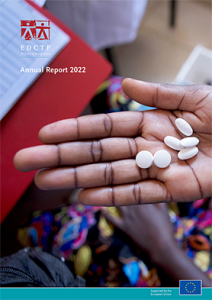EDCTP annual report 2022: Connecting numbers to impact
Launched in 2014, EDCTP2 set itself challenging targets in its efforts to advance the development of medical interventions against poverty-related infectious diseases affecting sub-Saharan Africa, while simultaneously strengthening clinical research capacity in the region. As we reach the nine-year mark, we take stock and consider how EDCTP2 investments – €826 million to date – are contributing to the fight against poverty-related infectious diseases, now and into the future. In this EDCTP annual report for 2022, we connect the numbers to the impact the programme is having in sub-Saharan Africa.
EDCTP has become the focal point of EU activities relating to poverty-related infectious disease research. Moreover, EDCTP2 provides a model for the organisation of highly productive partnerships between the two regions. This function was acknowledged in the recommendations made by the Advisory Group on Research and Innovation (R&I) for Africa–Europe Cooperation in February 2022, which highlighted the role played by EDCTP in strengthening capacity in Africa and described EDCTP2 as “the most cited joint programme strengthening health research and health systems in Africa and the flagship EU-Africa partnership in health R&D cooperation, with large successful, long-lasting research networks”.
“EDCTP2 operates as a partnership of equals between European and African partners. The latter are fully involved in the governance and priority setting of the programme, ensuring that its activities are tightly focused on the needs and priorities of the region.”
Dr Michael Makanga, EDCTP2 Executive Director
Sustainable impact
EDCTP2’s grants portfolio has expanded to 435 grants supporting projects in 44 sub-Saharan African countries. More than 300 African and 200 African institutions are participating in EDCTP-funded projects. These numbers emphasise how embedded EDCTP2 has become in the global health arena. Most importantly, however, is the sustainable impact being achieved in these countries, in terms of strengthened national health research systems able to plan, execute and oversee high-quality clinical research, and the advancement of novel medical interventions to address the region’s unmet medical needs.
Important examples in recent years have included funding of a phase II study of the R21/Matrix-M malaria vaccine, the first to achieve the WHO target of 75% efficacy. With the initial results of the analysis of phase III trial reported at the American Society of Tropical Medicine and Hygiene meeting in November 2022, data yet to be completed, the vaccine has already been approved by some sub-Saharan Africa countries, and looks likely to have a huge impact on malaria prevention when introduced.
Partnerships
Partnerships lie at the core of EDCTP’s work. These include partnerships with funders, one example being the joint work with the Global Health Innovative Technology Fund (GHIT) on the development of arpraziquantel for pre-school-aged children. In all, EDCTP2 has leveraged financial contributions of €423.6 million (total cash and in kind) from global partners and in addressing the impact of COVID-19 on ongoing activities, this figure continues to grow.
Impact on policy
Through extensive consultations, EDCTP2 ensures that its annually calibrated strategic research agendas reflects the priorities of sub-Saharan Africa countries, and that research studies address questions of direct relevance to policy and practice in the region.
Although most EDCTP2 projects are still ongoing, some have already delivered results that have influenced global or national policy. These include the AMBITION-cm study, the results of which triggered a rapid update to WHO guidance, while the AfriKADIA project is in discussion with the WHO Guidelines Development Group for visceral leishmaniasis. In malaria, the latest WHO guidelines make a strong recommendation for the use of pyronaridine–artesunate (Pyramax), for which key data were generated by EDCTP-funded networks.
Future-proof
The progress made in EDCTP2 provides an excellent foundation for its successor, the Global Health EDCTP3 Joint Undertaking, to maintain and strengthen collaboration and cooperation between Europe and Africa in global health research.

